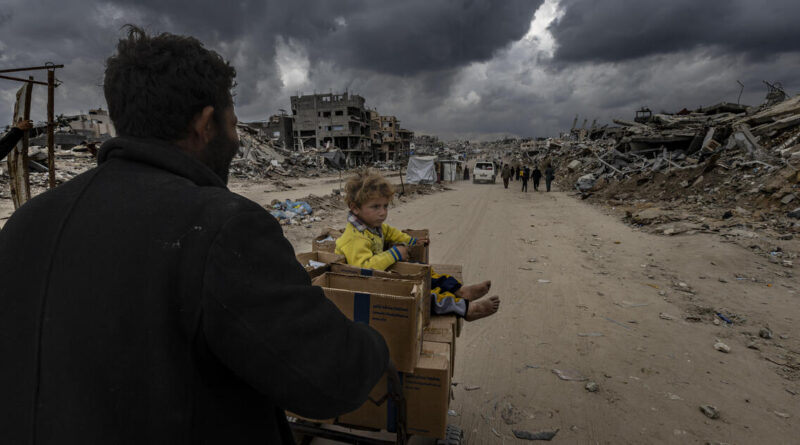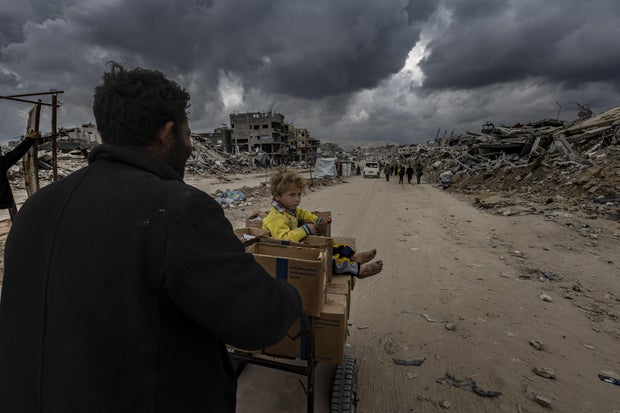Egypt and its neighbors working on alternative to Trump’s Gaza plan that wouldn’t displace Palestinians
Cairo — Optimism in the Arab world that President Trump might bring a permanent end to the war in the Gaza Strip and, with it, stability to the tumultuous Middle East, soared as he was given a lion’s share of the credit for ushering in the current ceasefire. But that hope has faded quickly since Mr. Trump suggested a plan to force Gaza’s entire population out and to “take over” the decimated Palestinian territory to develop it as a vacation destination.
Mr. Trump said the roughly 2.3 million Palestinians should be moved to Egypt and Jordan, apparently to make way for investors to move in and “just clean out the whole thing.”
The president’s suggestion sent a shockwave of confusion and anger sweeping across the Arab nations that surround Israel, and beyond.
“In Egypt, we have warned since the beginning of the crisis that what was happening was an attempt to render the Gaza Strip uninhabitable, paving the way for the displacement of the Palestinians,” Egyptian President Abdel Fattah el-Sissi said several days after Mr. Trump first suggested his plan. “I state it unequivocally: The displacement of the Palestinian people from their place is an injustice. We cannot condone or be a part of the unjust displacement of Palestinians.”
Meeting earlier this month in Washington with Mr. Trump, Jordan’s King Abdullah II, asked about the president’s proposal, said Egypt was working on an alternative plan with other Arab countries.
“We will be in Saudi Arabia to discuss how we can work with the president and with the United States,” Abdullah told reporters. “Let’s wait until the Egyptians can come and present it to the [U.S.] president, and not get ahead of ourselves.”
On Friday, a meeting to discuss that alternative proposal for Gaza’s future will take place in Riyadh, Saudi Arabia. While Mr. Trump has continued to insist that Egypt and Jordan will rehome the Palestinians from Gaza, his administration has also said it remains open to other suggestions.
“Right now, the only one who’s stood up and said, ‘I’m willing to help do it,’ is Donald Trump,” Secretary of State Marco Rubio said in an interview last week. “All these other leaders, they’re going to have to step up. If they’ve got a better idea, then now is the time.”
An Egyptian plan for Gaza takes shape
“Egypt is putting together a comprehensive, phased plan that seeks to rehabilitate Gaza,” Egyptian Foreign Ministry spokesperson Tamim Khallaf told CBS News on Wednesday. “The plan will span several years that would entail sequential phases of removing rubble and reconstruction.”
“It will be conducted in a way to ensure that Palestinians in Gaza remain in their homeland,” said Khallaf, adding that the plan “will be operationally both realistic and workable.”
Funding for the herculean task of rebuilding Gaza will be a vital component of any plan for after the war. As of January, the U.N. and World Bank estimated that 72% of the territory’s housing, 84% of its health facilities and 92% of its primary roads had been damaged or totally destroyed, and the bombing continued for another month from that point.
Khallaf told CBS News that Egypt was “in talks with the United Nations, through the U.N. Senior Humanitarian and Reconstruction Coordinator for Gaza, to jointly organize an international conference in Egypt for early recovery and reconstruction in Gaza, which will be essential to provide emergency relief activities and secure necessary funds to see the plan come to fruition and restore life back to Gaza.”
The plan being discussed in Riyadh is expected to be officially endorsed at an Arab summit scheduled for March 4 in Cairo. The plan is also expected to garner backing from further afield. Many U.S. allies in Europe have firmly rejected Mr. Trump’s call to relocate Gaza’s population, but there has been no other offer of an alternative.
Speaking Wednesday next to Spain’s prime minister after they met in Madrid, el-Sissi said the leaders had “emphasized the importance of the international community’s support and adoption of the reconstruction plan for the Gaza Strip, that does not involve the forcible displacement of the Palestinian people — again, without the displacement of the Palestinian people — from their land they so dearly cherish, and their ancestral homeland they will never abandon, and that ensures the immediate initiation of relief and early recovery operations.”
Mahmoud Hamda/Anadolu/Getty
Egypt has grappled for a post-war solution for Gaza that would be acceptable to all parties since the conflict was sparked by Hamas’ Oct. 7, 2023 terrorist attack on Israel.
It’s unclear how much support a unified Arab stance, even with broader international support, might garner from Mr. Trump or his close ally, Israeli Prime Minister Benjamin Netanyahu. Without their backing, it’s difficult to envision any proposal coming to fruition.
“Generational healing between Palestinians and Israelis is possible but can only transpire when Palestinians live in an independent state of their own,” Khallaf told CBS News. “We look forward to working with the U.S. administration in achieving the long-awaited peace in the region.”


